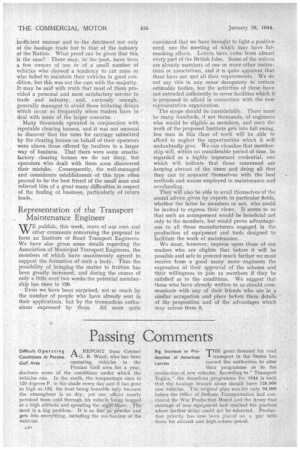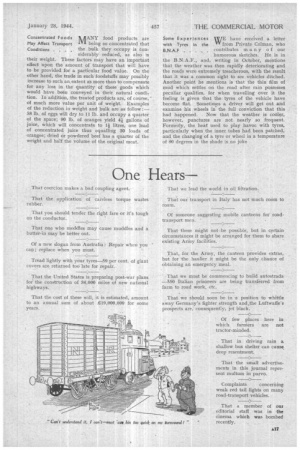Passing Comments
Page 18

Page 19

If you've noticed an error in this article please click here to report it so we can fix it.
Difficult Operating A .REPORT from Colonel Conditions in Persian rik G. R. Ward; who has been
Gulf Area ._ . operating vehicles in the
Persian Gall area for a year, discloses some of the conditions under which the vehicles run. In the south, the terriperatnre rises to 120 degrees F. in the shade every day and it has gone as high as 1.32, the heat being bearable only. because the atmosphere is so dry; yet one .officer nearly perished from cold through his vehicle being bogged at a high altitude and spending the night there. The sand is a big problem. it is as fine 'aS. powder and gets into everything, including the mechanism of the vehicles. ' ' THE great.demand for road transport in the States has caused the authorities to alter their programme as .to the production of new vehicles. According to "Transport Topics,' the American .programme for 1944 is Such that the haulage branch alone should have 128,000 new Vehicie.s. The original plan was. feir Only 34,000 before the Office of Defense Transportation had convinced the War Production Board andthe Army that shortage of new. equipment had reached the position where furthei:.4elay could not be tolerated. Production priority has now been placed on a par with those for aircraft andhigh-octane petrol.
Big Increase in Production of American Lorries MANY food products are
being so concentrated that the bulk they -occupy is considerably reduced, as also is their weight. These factors may have an important effect upon the amount of transport that will have to be provided for a particular food value. On the other hand, the trade in such foodstuffs may possibly increase to such an extent as more than to compensate for any loss in the quantity of these goods which would have been conveyed in their natural condi: tion. In addition,.the treated products are, of course, of much more value per unit of weight. Examples of the reduction in weight and bulk are as follow:— 58 lb. of eggs will dry to 11 lb. and occupy a quarter of the space; 90 lb. of oranges yield 4i gallons of juice, which will concentrate to 4 litres, one load of concentrated juice thus equalling 30 loads of oranges; dried or powdered beef hass-a quarter of the weight and half the volume of the original meat.
Concentrated Foods May Affect Transport Conditions . . . .
WE have received a letter from Private Colman, who contributes m any o f our
humorous sketches. Be is in the B.N.A.F., and, writing in October, mentions that the weather was then rapidly deteriorating and the roads were extremely treacherous, with the result that it was a common sight to see vehicles ditched. Another point he mentions is that the thin film of mud which settles on the road after rain possesses peculiar qualities, for when travelling over it the feeling is given that the tyres of the vehicle have become flat. Sometimes a driver will get out and examine his wheels in the full conviction that this had happened. Now that the weather is cooler, however, punctures are not nearly so frequent. Formerly, the heat used to play havoc with tyres, particularly when the inner tubes had been patched, and the changing of a tyre or wheel in a temperature of 90 degrees in the shade is no joke Some Experiences with Tyres In the B.N.A.F . . .




















































